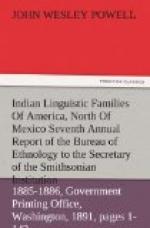= Tunicas, Gallatin in Trans. and Coll. Am. Antiq. Soc., II, 115, 116, 1836 (quotes Dr. Sibley, who states they speak a distinct language). Latham, Nat. Hist. Man, 341, 1850 (opposite mouth of Red River; quotes Dr. Sibley as to distinctness of language).
= Tonica, Gatschet, Creek Mig. Legend,
I, 39, 1884 (brief account of
tribe).
= Tonika, Gatschet in Science, 412, April
29, 1887 (distinctness as a
family asserted; the tribe calls itself
Tuni[ch]ka).
Derivation: From the Tonika word oni, “man,” “people;” t- is a prefix or article; -ka, -[ch]ka a nominal suffix.
The distinctness of the Tonika language, has long been suspected, and was indeed distinctly stated by Dr. Sibley in 1806.[98] The statement to this effect by Dr. Sibley was quoted by Gallatin in 1836, but as the latter possessed no vocabulary of the language he made no attempt to classify it. Latham also dismisses the language with the same quotation from Sibley. Positive linguistic proof of the position of the language was lacking until obtained by Mr. Gatschet in 1886, who declared it to form a family by itself.
[Footnote 98: President’s message, February 19, 1806.]
GEOGRAPHIC DISTRIBUTION.
The Tonika are known to have occupied three localities: First, on the Lower Yazoo River (1700); second, east shore of Mississippi River (about 1704); third, in Avoyelles Parish, Louisiana (1817). Near Marksville, the county seat of that parish, about twenty-five are now living.
TONKAWAN FAMILY.
= Tonkawa, Gatschet, Zwoelf Sprachen aus dem Suedwesten Nordamerikas, 76, 1876 (vocabulary of about 300 words and some sentences). Gatschet, Die Sprache der Tonkawas, in Zeitschrift fuer Ethnologie, 64, 1877. Gatschet (1876), in Proc. Am. Philosoph. Soc., XVI, 318, 1877.
Derivation: the full form is the Caddo or Wako term tonkaweya, “they all stay together” (weya, “all").
After a careful examination of all the linguistic material available for comparison, Mr. Gatschet has concluded that the language spoken by the Tonkawa forms a distinct family.
GEOGRAPHIC DISTRIBUTION.
The Tonkawa were a migratory people and a colluvies gentium, whose earliest habitat is unknown. Their first mention occurs in 1719; at that time and ever since they roamed in the western and southern parts of what is now Texas. About 1847 they were engaged as scouts in the United States Army, and from 1860-’62 (?) were in the Indian Territory; after the secession war till 1884 they lived in temporary camps near Fort Griffin, Shackelford County, Texas, and in October, 1884, they removed to the Indian Territory (now on Oakland Reserve). In 1884 there were seventy-eight individuals living; associated with them were nineteen Lipan Apache, who had lived in their company for many years, though in a separate camp. They have thirteen divisions (partly totem-clans) and observe mother-right.




